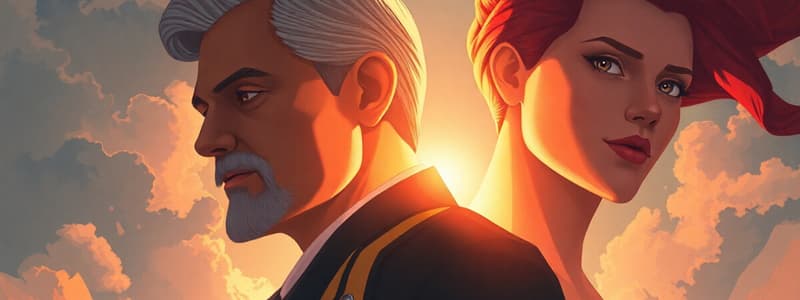Podcast
Questions and Answers
Which statement best describes the core belief of realism in international relations?
Which statement best describes the core belief of realism in international relations?
- Global political order is a social construct that depends on shared ideas, motives, and assumptions among actors.
- States are the primary actors in international politics, and they are driven by self-interest, mainly the quest for power and security. (correct)
- International cooperation is the most effective way to achieve global peace and stability.
- Democratic institutions and adherence to international law are sufficient to prevent conflicts.
How does realism view the role of morality in international politics?
How does realism view the role of morality in international politics?
- Moral principles should always guide state actions, even if it means sacrificing national interests.
- Moral considerations are secondary to the pursuit of national interests and security, and ethical decisions are situational. (correct)
- International politics should adhere to universal moral standards to foster cooperation and peace.
- States should prioritize humanitarian interventions to protect human rights globally.
According to realism, what is the primary characteristic of the international system?
According to realism, what is the primary characteristic of the international system?
- A condition of perpetual peace maintained through international law and organizations.
- Anarchy, where no supranational authority exists to enforce rules or resolve disputes among states. (correct)
- A hierarchical structure dominated by a single superpower that enforces global order.
- A network of interdependent states that prioritize cooperation and mutual benefit.
How does constructivism challenge the realist perspective on international relations?
How does constructivism challenge the realist perspective on international relations?
What is a key criticism of liberalism from a realist perspective?
What is a key criticism of liberalism from a realist perspective?
Which of the following best describes the constructivist view of anarchy in the international system, contrasting it with the realist view?
Which of the following best describes the constructivist view of anarchy in the international system, contrasting it with the realist view?
How do realist and constructivist perspectives differ on the role of state identity in international relations?
How do realist and constructivist perspectives differ on the role of state identity in international relations?
E.H. Carr criticized Liberalism, what was his main argument?
E.H. Carr criticized Liberalism, what was his main argument?
How did the failure of the League of Nations influence the rise of realism in international relations theory?
How did the failure of the League of Nations influence the rise of realism in international relations theory?
Which of the following aligns with Morgenthau's view?
Which of the following aligns with Morgenthau's view?
Flashcards
Realism
Realism
A mainstream theory emphasizing state power and security as primary goals in global politics.
Three Types of Realism
Three Types of Realism
Classical realism, neorealism/structural realism, and neoclassical realism.
Liberalism
Liberalism
The belief that democratic institutions would foster global peace and cooperation.
Anarchy in International Relations
Anarchy in International Relations
Signup and view all the flashcards
Realist View of State Goals
Realist View of State Goals
Signup and view all the flashcards
Situational Ethics for Leaders
Situational Ethics for Leaders
Signup and view all the flashcards
Core Belief of Classical Realism
Core Belief of Classical Realism
Signup and view all the flashcards
Constructivism
Constructivism
Signup and view all the flashcards
Constructivist View of State Action
Constructivist View of State Action
Signup and view all the flashcards
Constructivist Emphasis on Ideas
Constructivist Emphasis on Ideas
Signup and view all the flashcards
Study Notes
- Realism is a mainstream theory in global politics.
Realism and Liberalism
- Realism arose as a reaction to the failure of liberalism to secure world peace.
- The League of Nations was formed after WWI to prevent global conflict through democratic institutions and national self-determination.
- After WWII, liberalism was seen as a failure, leading to the rise of realism.
- The end of the Cold War briefly raised hopes for liberalism, but conflicts in the Balkans and Rwanda led to the rejection of liberalism.
Types of Realism
- Classical realism dates from the 6th century BCE to the 20th century
- Neorealism/Structural realism started from 1979
- Neoclassical realism started in the 1990s
The Failure of Liberalism
- US President W. Wilson (1856-1924) believed democratic institutions foster peace, democracies are less likely to wage war, and democratic leaders are accountable.
- Wilson's liberalism failed to secure peace.
Other Circumstances
- The economic crisis of the 1930s also contributed to its failure
- The rise of authoritarian regimes across Europe
- Aggressive foreign policy
Realism as a Response
- British scholar E.H. Carr criticized liberalism as naive, asserting that international relations are based on conflict and power struggles.
- Realism became credible after WWII due to the perceived failure of liberalism and the horrors of Nazism and the Holocaust.
Liberalism vs. Realism
- Liberalism emphasizes international law, organizations, interdependence, cooperation, and peace.
- Realism focuses on power politics, national security, aggression, conflict, and war.
Realism in Politics
- International politics is viewed as a struggle for power, where power is always the immediate aim.
Realism - Key themes
- The key themes are a pessimistic view of human nature in which international relations are based on conflict.
- Sovereign states are regarded as the only legitimate actors in global politics.
- The international system is inevitably anarchic due to the absence of a supranational authority.
Realism & Ethics
- The international system cannot be improved by ideas, institutions, or universal human values.
- Leaders are responsible for the citizens entrusted to their care.
- Ethical decisions must be made in response to ethical dilemmas.
Classical Realism - Hans J. Morgenthau
- International relations are rooted in aggressive and selfish human nature.
- Politics are governed by objective laws rooted in unchanging human nature
- Self-interest, defined as the quest for power, drives states' actions.
- Politics requires situational ethics and should not be judged by external benchmarks.
- Politics is an autonomous sphere of action.
- A lust for dominance leads to certain political circumstances and goals.
Constructivism
- Constructivism is a post-positivist approach that views global political order as a historical and social construct dependent on motives, ideas, and assumptions.
- It is viewed as a social theory.
- A core tenet is that people act towards others based on the meaning those others have for them.
- History isn't a process with set outcomes; it depends on the choices and actions and is a world of human consciousness.
- It explains how the world changes, while symbols, rules, and knowledge shape people's interpretations.
Influences
- Max Weber's "Verstehen" and symbolic interactionism
- Everything people say and do has to be interpreted in a cultural and social context
- Social reality doesn't just exist externally; it's created through interactions
- International relations are not inherently anarchical; it depends how we interact with it.
Key Concepts
- Human relations consist of commonly held beliefs and ideas.
- Ideas determine how people perceive themselves and others and shape collective institutions.
- Ideas have consequences and are more important than physical manifestations of power.
- All human relations consist predominantly of thoughts and ideas commonly held beliefs, assumptions, pre, and misconceptions about the world.
- Ideas determine how people imagine themselves and their relations with others.
- Ideas and concepts both create and shape collective institutions and social/political practices.
- All human relations consist predominantly of thoughts and ideas commonly held beliefs, assumptions, pre, and misconceptions about the world.
Kantian States
- Where states don't compete but cooperate
- Democratic institutions encourage peaceful international order.
Studying That Suits You
Use AI to generate personalized quizzes and flashcards to suit your learning preferences.




